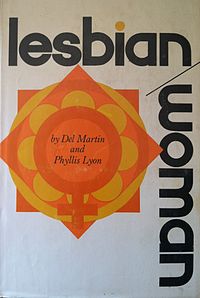
Eros and Civilization: A Philosophical Inquiry into Freud is a book by the German philosopher and social critic Herbert Marcuse, in which the author proposes a non-repressive society, attempts a synthesis of the theories of Karl Marx and Sigmund Freud, and explores the potential of collective memory to be a source of disobedience and revolt and point the way to an alternative future. Its title alludes to Freud's Civilization and Its Discontents (1930). The 1966 edition has an added "political preface".

Gay Science: The Ethics of Sexual Orientation Research is a 1997 book by the philosopher Timothy F. Murphy about scientific research on sexual orientation.

Virtually Normal: An Argument About Homosexuality is a book about the politics of homosexuality by the political commentator Andrew Sullivan, in which the author criticizes four different perspectives on gay rights in American society, which he calls the "Prohibitionist", "Liberationist", "Conservative", and "Liberal" views, seeking to expose internal inconsistencies within each of them. He also criticizes the philosopher Michel Foucault and gay rights activists he considers influenced by Foucault, and argues in favor of same-sex marriage and an end to the don't ask, don't tell policy, which banned service by openly gay people in the US military. However, he makes a case against legislation aimed at preventing private discrimination against gay people.

Patterns of Sexual Behavior is a 1951 book by anthropologist Clellan S. Ford and ethologist Frank A. Beach, in which the authors integrate information about human sexual behavior from different cultures, and include detailed comparisons across animal species, with particular emphasis on primates. The book received positive reviews and has been called a classic. It provided the foundation for the later research of Masters and Johnson.

Virtual Equality: The Mainstreaming of Gay and Lesbian Liberation is a 1995 book about gay rights by lawyer and civil rights activist Urvashi Vaid, in which the author argues that LGBT movements in the United States have been only partially successful in achieving their goals, and that gay and lesbian Americans continue to suffer from discrimination and other problems. Vaid maintains that the American gay rights movement must reconsider its tactics and move from advocacy of civil equality to aiming at social change.

The Evolution of Human Sexuality is a 1979 book about human sexuality by the anthropologist Donald Symons, in which the author discusses topics such as human sexual anatomy, ovulation, orgasm, homosexuality, sexual promiscuity, and rape, attempting to show how evolutionary concepts can be applied to humans. Symons argues that the female orgasm is not an adaptive trait and that women have the capacity for it only because orgasm is adaptive for men, and that differences between the sexual behavior of male and female homosexuals help to show underlying differences between male and female sexuality. In his view, homosexual men tend to be sexually promiscuous because of the tendency of men in general to desire sex with a large number of partners, a tendency that in heterosexual men is usually restrained by women's typical lack of interest in promiscuous sex. Symons also argues that rape can be explained in evolutionary terms and feminist claims that it is not sexually motivated are incorrect.
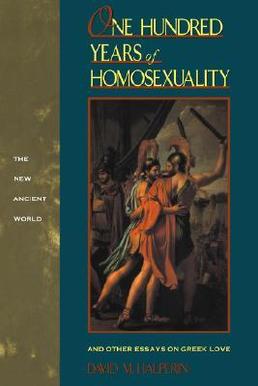
One Hundred Years of Homosexuality: and other essays on Greek love is a 1990 book about homosexuality in ancient Greece by the classicist David M. Halperin, in which the author supports the social constructionist school of thought associated with the French philosopher Michel Foucault. The work has been praised by several scholars, but criticized by others, some of whom have attributed to Halperin the view that the coining of the word "homosexuality" in the nineteenth century brought homosexuality into existence. The book was often reviewed alongside John J. Winkler's The Constraints of Desire (1990).

A Separate Creation: The Search for the Biological Origins of Sexual Orientation, also published with the subtitle How Biology Makes Us Gay, is a 1996 book about the development of sexual orientation by the journalist Chandler Burr. It received mainly positive reviews, commending it as a useful discussion of scientific research on sexual orientation and the politics surrounding the issue.

Homosexuality: A Philosophical Inquiry is a 1988 book by the philosopher Michael Ruse, in which the author discusses different theories of homosexuality, evaluates the moral status of homosexual behavior, and argues in favor of gay rights.

Male Homosexuality in Four Societies: Brazil, Guatemala, the Philippines and the United States is a 1985 work about male homosexuality by the sociologists Frederick L. Whitam and Robin Mathy.

The Homosexual Matrix is a book by American psychologist Clarence Arthur Tripp, in which the author discusses the biological and sociological implications of homosexuality, and also attempts to explain heterosexuality and bisexuality. The book was first published in 1975 by McGraw-Hill Book Company; it was republished in a revised edition in 1987. Based on his review of the evidence, Tripp argues that people do not become homosexual due to factors such as hormone levels, fear of the opposite sex, or the influence of dominant and close-binding mothers, and that the amount of attention fathers give to their sons has no effect on the development of homosexuality. He criticizes Sigmund Freud and argues that psychoanalytic theories of the development of homosexuality are untenable and based on false assumptions. He maintains that sexual orientation is not innate and depends on learning, that early puberty and early masturbation are important factors in the development of male homosexuality, and that a majority of adults are heterosexual because their socialization has made them want to be heterosexual. He criticizes psychotherapeutic attempts to convert homosexuals to heterosexuality and argues in favor of social tolerance of homosexuality and non-conformist behavior in general.
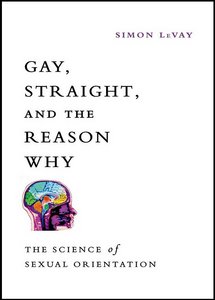
Gay, Straight, and the Reason Why: The Science of Sexual Orientation is a book by the neuroscientist Simon LeVay and published by Oxford University Press. The book received mainly positive reviews, praising it for LeVay's wide-ranging overview of scientific research on sexual orientation. In 2012, it received the Bullough Book Award for the most distinguished book written for the professional sexological community published in a given year.
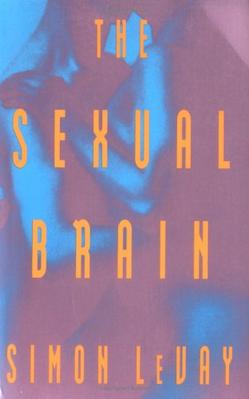
The Sexual Brain is a 1993 book about brain mechanisms involved in sexual behavior and feelings, and related topics such as sexual orientation, by the neuroscientist Simon LeVay. The book was praised as a well-written work on science. However, some reviewers pointed out factual errors, and noted that LeVay failed to prove that homosexuality has a biological basis.
Homosexuality: Disease or Way of Life? is a 1956 book by the psychoanalyst Edmund Bergler, in which the author argues that homosexuality is a curable illness. Bergler denies that homosexuality is caused by hormonal or other biological factors, the Oedipus complex, or having a dominant mother and a weak or absent father, instead attributing both male and female homosexuality to pre-Oedipal factors involving an unsolved masochistic conflict with the mother during the earliest period of infancy. According to Bergler, homosexuality in men reflects unconscious fear and hatred of women. Bergler argues that there are several different types of homosexuality, each with a distinct clinical profile. Bergler rejects the existence of bisexuality, maintaining that all supposed bisexuals are homosexuals, and criticizes the work of sex researcher Alfred Kinsey. He characterizes homosexual men as sexually promiscuous, and argues that this promiscuity is a result of their unsatisfying sex lives and masochistic craving for danger. Bergler argues against immediately repealing laws against homosexuality, though he suggests that such laws could perhaps be repealed in the future if other measures against homosexuality proved effective. Bergler proposes the publicizing of his ideas as a measure against homosexuality.

Sexuality and Its Discontents: Meanings, Myths, and Modern Sexualities is a 1985 book about the politics and philosophy of sex by the sociologist Jeffrey Weeks. The book received positive reviews, crediting Weeks with explaining the theories of sexologists and usefully discussing controversial sexual issues. However, Weeks was criticised for his treatment of feminism and sado-masochism.

Sex and Reason is a 1992 book about human sexuality by the economist and federal judge Richard Posner, in which the author attempts to explain sexual behavior in economic terms and discusses a range of controversial subjects related to sex, proposing reforms in American laws.

What Wild Ecstasy: The Rise and Fall of the Sexual Revolution is a 1997 book about the sexual revolution by John Heidenry. The book received mixed reviews. It was described as interesting and Heidenry was complimented for his discussions of figures such as Bob Guccione, Hugh Hefner, Larry Flynt, and Reuben Sturman. However, he was criticized for his research methods. He was accused of plagiarism because of the use he made of material by other writers, receiving criticism in particular from the journalist Philip Nobile. Critics also wrote that he focused disproportionately on pornography and gave insufficient attention to feminism and women's issues.

The Science of Desire: The Search for the Gay Gene and the Biology of Behavior is a 1994 book by the geneticist Dean Hamer and the journalist Peter Copeland, in which the authors discuss Hamer's research into the genetics of homosexuality.

The Homosexualization of America, The Americanization of the Homosexual is a 1982 book about LGBT rights in the United States by the gay rights activist Dennis Altman, in which the author discusses the emergence of gay people as a minority group. The book received positive reviews, crediting Altman with providing a useful discussion of gay people in the United States.
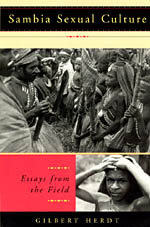
Sambia Sexual Culture: Essays from the Field is a 1999 book about the Simbari people and their sexual practices by the anthropologist Gilbert Herdt. The book received negative reviews, accusing Herdt of being biased in his approach and his conclusions. In the book the Simbari people are called Sambia people
